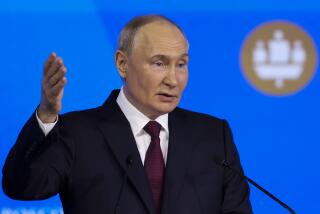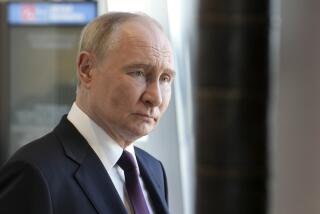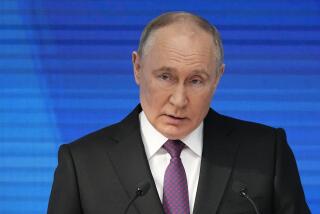Putin says Russia will do its best to prevent terrorism at Olympics
- Share via
MOSCOW — President Vladimir Putin said Russian authorities will “do our best” to prevent terrorist attacks at the Sochi Winter Olympics, which will take place in the shadow of an Islamist insurgency in the restive Caucasus region.
“We have a perfect understanding of the scope of the threat and how to deal with it and how to prevent it,” Putin said in an interview broadcast Sunday. “I hope that our law enforcement agencies will deal with it with honor and dignity, the way it was during other major sports and political events.”
The interview was recorded Friday in Sochi with a number of Russian and foreign television networks, including ABC.
About 40,000 police and special forces officers will be enforcing security at the Games under the command of a special round-the-clock headquarters, Putin said. Also, as of Jan. 7, a special security cordon for people and vehicles was introduced in the area around Sochi, he said.
“Our task as organizers is to ensure the security of athletes and guests at this major sports event, and we will do our best,” the president said. “We will protect our air and sea space as well as the mountain cluster.”
Putin added that the concentration of measures in and around Sochi will not undermine security in other parts of Russia.
Security concerns have grown ahead of the Winter Games after three deadly terrorist attacks were carried out by suicide bombers, one in October and two at the end of December, in the Russian industrial center of Volgograd, about 400 miles north of Sochi.
They were followed by a number of lower-scale attacks and bombings in the southern region of Stavropol and in Dagestan, a volatile republic in the North Caucasus region.
A radical Islamist group issued a videotape Sunday claiming responsibility for the two December bombings in Volgograd. The tape included video from before the attack that showed two men who were purported to be the suicide bombers. The video demanded that Russia “immediately withdraw from the lands of the Caucasus.”
North Caucasus Islamist resistance leader Doku Umarov declared in a video statement distributed on the Internet last June that his fighters would use “maximum force” to keep the Sochi Olympic Games from being “held on the bones of our ancestors.”
Last week, the head of Chechnya and Putin’s staunchest Caucasus loyalist, Ramzan Kadyrov, said that Umarov had been killed. Kadyrov said he based his assertion on intercepted phone conversations among rebel leaders, but the information has not been confirmed by Russian authorities.
In his interview, Putin also rejected allegations of widespread corruption during the construction of venues and infrastructure at Sochi, where the Games are set to open Feb. 7.
“What instances of corruption?” he said. “I do not see serious corruption.” Rather, he said, he saw a problem with exaggerated figures for the cost of the Games.
Putin put the final figure for construction costs associated with the Olympics at $6.5 billion, a far cry from the $50 billion estimated by Kremlin critics and some Russian officials.
Putin acknowledged that his sum might be on the low side. “If we take into account the expenses associated with the development of relevant infrastructure, the sum may be larger, but those expenses are not directly related to the Olympic Games,” the president said.
One of Putin’s most outspoken critics, former Deputy Prime Minister Boris Nemtsov, has called the Sochi Games “the scam of the century.”
“I have every reason and lots of facts at my disposal to believe that corrupt officials and businessmen close to Putin pocketed from $25 billion to $30 billion in the course of the construction,” Nemtsov said in a recent interview with The Times.
Putin denounced these allegations, saying they were spread by forces intent on undermining the Russian Olympic effort.
“There are always some forces that are always against everything, even against the Olympic project,” Putin said. “I don’t know why, but probably it is their job, probably it is the way they feel, maybe somebody must have offended them in their life.”
More to Read
Sign up for Essential California
The most important California stories and recommendations in your inbox every morning.
You may occasionally receive promotional content from the Los Angeles Times.













